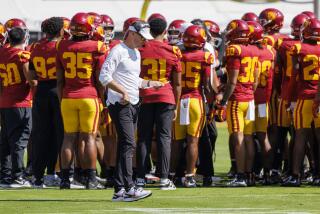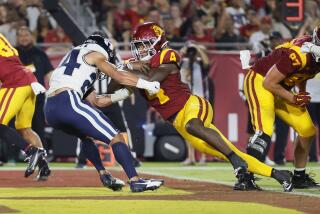Issues from 5 to 1, A to zebra
- Share via
With a veritable herd of officials in black-and-white stripes filling the landscape, USC’s practice facility looked more like the Serengeti than a football field.
USC employs a crew of officials at every practice, but after accruing 10 penalties last week against Arizona State, Coach Pete Carroll on Tuesday summoned extra whistle-blowers to help cure the Trojans.
“We’ve got to find a way to fix this,” Carroll said.
USC leads the Pacific 10 Conference in penalties, just one of the issues that, left unchecked, could prevent the Trojans from ascending in the polls and gaining a bid to the Bowl Championship Series title game.
With struggling Washington State, a 43-point underdog, coming up next, USC -- ranked No. 6 by the Associated Press, No. 5 in the Harris Interactive Poll and No. 4 in the USA Today coaches’ poll -- is turning inward during preparation.
The Trojans are focusing on correcting problems. Some popped up in the first two games; others figured prominently in their loss at Oregon State and continued to varying degrees in victories over Oregon and Arizona State.
A look at five issues affecting the Trojans as they approach the season’s midpoint:
Flag days
Running backs coach Todd McNair walked past linebacker Kaluka Maiava on Monday and greeted him with, “What’s up, P?”
Explained Maiava sheepishly: “They call me P because I lead the team in penalties.”
He’s not proud of the title.
Neither are the Trojans fond of averaging a conference-worst nine penalties and 86 penalty yards a game. Last week against Arizona State, officials flagged the Trojans 10 times for 86 yards.
USC has been plagued by personal-foul penalties. They cost the Trojans a shutout against Virginia and led to an Oregon State touchdown in its 27-21 upset at Corvallis. They contributed to an Oregon touchdown drive the following week and continued against Arizona State, which lacked the firepower to capitalize.
Part of the problem, Carroll said, is that players are still adapting to new rules that protect quarterbacks.
“We’ve been hitting the quarterback so many times . . . we’re just more susceptible,” Carroll said. “We just have to do it better and be more in line with what they’re calling so we don’t put ourselves in bad situations.”
Short (on) yardage
LenDale White attended the opener at Virginia and last Saturday’s game against Arizona State at the Coliseum, the former tailback drawing cheers from Trojans fans when spotted leaving the field.
Unfortunately for USC, the bulky White turned pro after the 2005 season and is not available for the short-yardage situations that were his staple during a record-setting career.
The Trojans have mostly struggled to run effectively in those situations this season.
“It hasn’t been real bad, but it’s concerning us,” offensive line coach Pat Ruel said.
USC’s inability to convert a third and one by tailback Stafon Johnson on its first possession at Oregon State gave confidence to the upstart Beavers.
Against Arizona State, a first-quarter drive stalled when Johnson was stopped on third and two at the Sun Devils’ 41-yard line. Carroll, who has almost made going for it on fourth down a signature move, opted to punt on the next play.
USC has converted 45% of its third-down opportunities, but offensive coordinator Steve Sarkisian acknowledged that the percentage would be higher if the short-yardage game was more effective.
“That’s the difference between 45% and being maybe a 52% third-down team and showing that you can extend drives and get more plays,” he said.
Assignment errors and faulty positioning have hurt the Trojans, Ruel said, but he does not advocate a ram-it-down-their-throats routine on third down.
“The more predictable you are, the easier it is for [the defense],” he said. “But the issue is, if you’re going to have a variety of things you do, then make sure you know how to do them.
“We just have failed a couple of times.”
Dropped connections
USC’s receiving corps quieted preseason questions about dependability with mostly sure-handed play through four games.
Damian Williams, Patrick Turner and Ronald Johnson helped give the Trojans one of the Pac-10’s top passing games.
But Williams dropped two passes against Arizona State and Johnson could not hold onto another.
Johnson spent extra time after practice Monday catching 20 passes similar to the one he dropped. “It’s not something to be concerned about,” he said.
Carroll agreed, citing windy conditions as the cause of the struggle. “They’ve been catching everything, so I’m not worried about them,” he said. “If I knew they didn’t have good hands and they were missing balls, I’d say, ‘Oh, we’re not getting the best out of them.’
“But they’ll be right back.”
Lost options
During the last six seasons, USC’s offense was at its best when the fullback was blocking well and catching passes, and the tight end was an integral part of the passing attack.
Fullback Stanley Havili and tight end Blake Ayles caught touchdown passes against Ohio State, but those are the only times they have found the end zone.
A season after tight end Fred Davis caught a team-high 62 passes, Ayles has caught six, fellow tight end Anthony McCoy four.
Havili, limited last week because of a neck injury, also affects the short-yardage running game. “We want to get him going,” Sarkisian said. “It just hasn’t played out the way we would have hoped.”
Soft-serve schedule
Years ago, when this year’s schedule was put together, who thought traveling 3,000 miles to play Virginia plus games against perennial powers Ohio State and Notre Dame wouldn’t be strong enough?
The problem, of course, is the competition in the Pacific 10 Conference, which is definitely weaker than usual. Therefore, USC’s schedule is certain to be a topic of discussion and computer crunching.
Among upcoming opponents, Arizona (4-2), No. 25 California (4-1), Stanford (4-3) and Notre Dame (4-2) have winning records, but wins over Washington State (1-6), Washington (0-5) and UCLA (2-4) would do the Trojans no favors.
Then again, beating up overmatched opponents has not foiled recent drives to the BCS title game.
Said one USC coach: “It hasn’t hurt Ohio State.”
--
More to Read
Fight on! Are you a true Trojans fan?
Get our Times of Troy newsletter for USC insights, news and much more.
You may occasionally receive promotional content from the Los Angeles Times.







